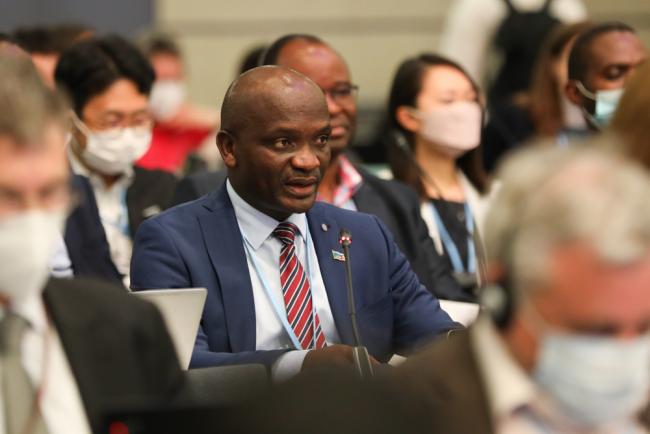Ahead of the final stage of the Global Stocktake (GST) later this year, the African Group of Negotiators on Climate Change (AGN) has called for a balanced approach by removing what it terms, inherent bias for mitigation at the expense of adaptation.

Speaking during the Heads of Delegation Meeting, which considered key elements of the desired GST outcome across the different thematic areas, AGN Chair, Ephraim Mwepya Shitima, said the inherent bias in favour of mitigation ought to be rectified while the needs of adaptation and recognition of adaptation actions as part of the contribution of Parties towards the global effort should be accorded sufficient attention.
The Heads of Delegation Meeting held virtually on Thursday, March 9, 2023.
The Global Stocktake, as enshrined in Article 14 of the Paris Agreement, is a process for taking stock of the implementation of the Paris Agreement with the aim to assess the world’s collective progress towards achieving the purpose of the agreement and its long-term goals.
The first stocktake got underway at the UN Climate Change Conference in Glasgow in November 2021 and is expected to conclude at COP28. Each stocktake is a two-year process that happens every five years.
“Firstly, the outcome ought to be comprehensive, balanced and facilitate progress across all the thematic areas, and respect the priority issues of all Parties and stakeholders,” said Shitima.
“The inherent bias in favour of mitigation ought to be rectified while the needs of adaptation and recognition of adaptation actions as part of the contribution of Parties towards the global effort should be accorded sufficient attention,” he said.
The AGN Chair also called for the GST outcome to cover the state of current efforts—the gaps and the options for equitably closing them, with particular emphasis on finance and other means of implementation needed to raise ambition.
“This should be primarily based on the needs of developing countries; hence a ‘needs-based approach’ must be applied to all elements of climate action for developing countries to effectively contribute to climate action,” noted Shitima.
He further recalled the overarching message and importance of ensuring that all subsequent actions to meet the goals of the Paris Agreement and the UNFCCC are based on the principles of fairness or equity and Common but Differentiated Responsibilities and Respective Capabilities, and in light of different national circumstances (CBDR-RC).
“This should make clear that there are different pathways to achieving the goals of the Paris Agreement and that these will be based on; historical responsibility; national circumstances and development context particularly the right to poverty reduction and the attainment of the sustainable development goals; and unique circumstances some regions are facing from the impacts of climate change as catalogued by the best available science,” he said.
With regards to steps required ahead of, and at COP28 to facilitate solution-oriented outcomes, the AGN is calling for additional time for discussions to enable Parties to develop a shared understanding of the implications of the findings from the technical assessment.
“In addition to other meeting windows that should be utilided for Parties to reach a shared understanding, we propose that sufficient time during the sessional periods be allocated to GST negotiations and avoid scheduling GST sessions to clash with other equally important work programmes,” concluded Shitima.
While developed parties continue to push for cross-cutting mitigation efforts by all parties regardless of historical and/or current contributions to global emissions and circumstances, the AGN and other developing Parties to the UNFCCC have, over the years been calling for more ambition and resources for adaptation to support developing parties cope with devastating effects of climate change that they are already suffering.
